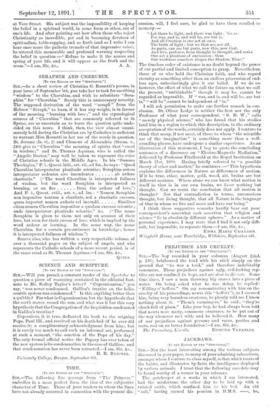SERAPHIM AND CHERUBIM.
[TO THE EDITOR OF THE "SPECTATOR."] SIR,—In a short review of Christina G. Rossetti's poems, in your issue of September 5th, you take her to task for ascribing "wisdom" to the Cherubim, and wish to substitute "Sera- phim" for "Cherubim." Surely this is unnecessary severity. The 'supposed derivation of the word " seraph " from the Hebrew " Sara.ph," to barn, if it has any weight, is in favour -of the meaning " burning with love ;" and the etymological sources of " Cherubim" that are commonly referred to itt Syriac, are so uncertain as to leave the question quite unde- cided on this score. I think, then, the view almost unani- mously held during the Christian era by Catholics is sufficient to warrant Miss Rossetti in her use of the words in question. St. Jerome (Is. vi., 2) and Clement of Alexandria (Strom. v., 240) give to " Cherubim " the meaning of spirits that " excel in wisdom ;" and St. Thomas Aquinas, who is called the "Angelic Doctor," may well be taken to represent the voice of Christian schools in the Middle Ages. In his "Summa Theologica," P. i., Quwst. lxiii., art. vii., ad lm., he says : " Quod Cherubim interpretatur plenitudo scientiw ; Seraphim autem
interpretatur ardentes sive incendentes ab ardore charitatis." (" The word Cherubim is interpreted fullness of wisdom, but the word Seraphim is interpreted as burning, or on fire from the ardour of love.") And P. i., Qunst. cviii., art. v., ad 5m. : " Nomen Seraphim non imponitur tantum a charitate, sed a charitatis excessu, quern importat nomen ardoris vel incendii Similiter -etiam nomen Cherubim imponitur a quodam excessu scienthe ; uncle interpretatur plenitudo scientiw," &c. (" The name Seraphim is given to them not only on account of their love, but even for their excess of love, which is implied by the word ardour or burning. In the same way, the name Cherubim for a certain pre-eminence in knowledge ; hence it is interpreted fullness of wisdom.") Suarez also, who has written a very respectable volume of over a thousand pages on the subject of angels, and who represents the Catholic schools of a more recent period, is of the same mind as St. Thomas Aquinas.—I am, Sir, &c.,
QUIES.


































 Previous page
Previous page